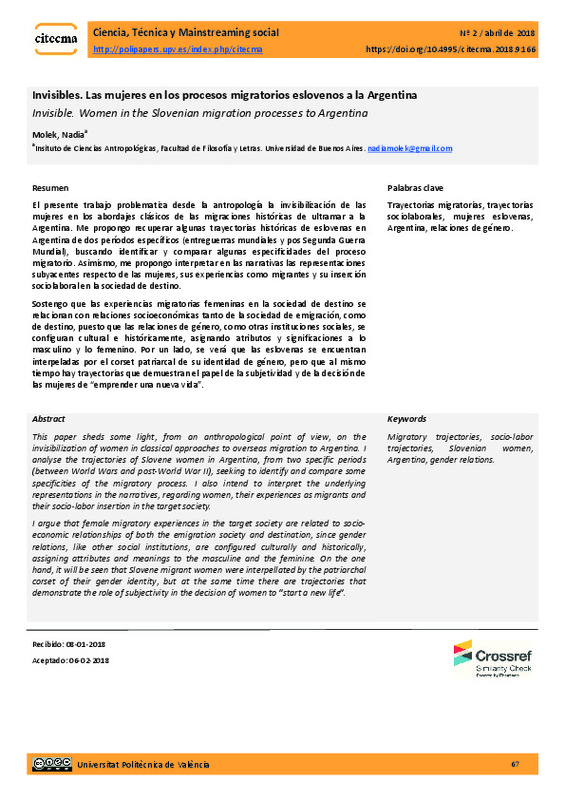|
Resumen:
|
[EN] This paper sheds some light, from an anthropological point of view, on the invisibilization of women in classical approaches to overseas migration to Argentina. I analyse the trajectories of Slovene women in Argentina, ...[+]
[EN] This paper sheds some light, from an anthropological point of view, on the invisibilization of women in classical approaches to overseas migration to Argentina. I analyse the trajectories of Slovene women in Argentina, from two specific periods (between World Wars and post-World War II), seeking to identify and compare some specificities of the migratory process. I also intend to interpret the underlying representations in the narratives, regarding women, their experiences as migrants and their socio-labor insertion in the target society.
I argue that female migratory experiences in the target society are related to socioeconomic relationships of both the emigration society and destination, since gender relations, like other social institutions, are configured culturally and historically, assigning attributes and meanings to the masculine and the feminine. On the one hand, it will be seen that Slovene migrant women were interpellated by the patriarchal corset of their gender identity, but at the same time there are trajectories that demonstrate the role of subjectivity in the decision of women to "start a new life".
[-]
[ES] El presente trabajo problematiza desde la antropología la invisibilización de las mujeres en los abordajes clásicos de las migraciones históricas de ultramar a la Argentina. Me propongo recuperar algunas trayectorias ...[+]
[ES] El presente trabajo problematiza desde la antropología la invisibilización de las mujeres en los abordajes clásicos de las migraciones históricas de ultramar a la Argentina. Me propongo recuperar algunas trayectorias históricas de eslovenas en Argentina de dos períodos específicos (entreguerras mundiales y pos Segunda Guerra Mundial), buscando identificar y comparar algunas especificidades del proceso migratorio. Asimismo, me propongo interpretar en las narrativas las representaciones subyacentes respecto de las mujeres, sus experiencias como migrantes y su inserción sociolaboral en la sociedad de destino.
Sostengo que las experiencias migratorias femeninas en la sociedad de destino se relacionan con relaciones socioeconómicas tanto de la sociedad de emigración, como de destino, puesto que las relaciones de género, como otras instituciones sociales, se configuran cultural e históricamente, asignando atributos y significaciones a lo masculino y lo femenino. Por un lado, se verá que las eslovenas se encuentran interpeladas por el corset patriarcal de su identidad de género, pero que al mismo tiempo hay trayectorias que demuestran el papel de la subjetividad y de la decisión de las mujeres de “emprender una nueva vida”.
[-]
|








